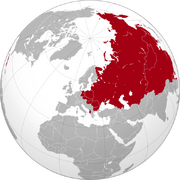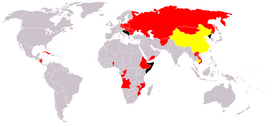
The Soviet Union and other countries in the world under a communist government modelled on the country, after the Cuban Revolution of 1959 and before the official Sino–Soviet split of 1961.
The informal term "Soviet Empire" is used by critics of the Soviet Union to refer to that country's perceived imperialist foreign policy during the Cold war. The nations said to be part of the "Soviet Empire" were independent countries with separate governments that set their own policies, but those policies had to remain within certain limits decided by the Soviet Union. Failure to stay within the limits could result in military intervention by the Warsaw pact. Countries in this situation are often called satellite states. This arrangement was always unofficial.
Though the Soviet Union was not ruled by an emperor and declared itself anti-imperialist, critics argue that it exhibited tendencies common to historic empires. Some scholars hold that the Soviet Union was a hybrid entity containing elements common to both multinational empires and nation states. It has also been argued that the USSR practiced colonialism as did other imperial powers, Maoists argued that the Soviet Union had itself become an imperialist power while maintaining a socialist façade (Social Imperialism).
The other dimension of "Soviet imperialism" is cultural imperialism. The policy of Soviet cultural imperialism implied the Sovietization of culture and education at the expense of local traditions.
Influence[]
The Soviet Empire is considered to have included the following:
The Soviet Union and its satellite states[]
These countries were the closest allies of the Soviet Union. They were members of the Comecon, a Soviet-led economic community founded in 1949. In addition, the ones located in Eastern Europe were also members of the Warsaw Pact. They were sometimes called the Eastern block in English and were widely viewed as Soviet satellite states
- Bulgaria
- Romania
- Hungary
- poland
- East Germany
- Czechoslovakia
- Cuba
- Mongolia
- North Vietnam/Vietnam (1950-1976/1976-1991)
- Albania (ended participation in Comecon after 1961 due to Sino-Soviet Split)
North Korea was a Soviet ally, but always followed a highly isolationist foreign policy and therefore it did not join the Comecon or any other international organization of communist states.
Soviet involvement in the Third World[]
- Egypt (1954-1973)
- Syria (1955–1991)
- India ()
- Iraq (1958–1961)
- Guinea (1960–1978)
- Somalia (1961–1977)
- Ghana (1964–1966)
- Peru (1968–1975)
- Sudan (1968–1972)
- Libya (1969–1991)
- People's republic of Congo (1969–1991)
- Chile (1970–1973)
- People's republic of Yemen (1969–1990)
- Uganda (1966–1971)
- Madagascar (1972-1991)
- People's republic of Ethiopia (1974–1991)
- Lao People's democratic republic (1975–1991)
- People's democratic of Benin (1975–1979)
- People's republic of (1975–1990)
- People's republic of Angola (1977–1991)
- Democratic republic of Afganistan (1978–1991)
- Grenada (1979-1983)
- Nicaragua (1979–1990)
- People's republic of Kampuchea (1979–1989)
Communist states opposed to the Soviet Union[]
Some communist states were openly opposed to the Soviet Union and many of its policies. Though their

Communist state alignments in 1980: pro-Soviet (red); pro-Chinese (yellow); and the non-aligned North Korea and Yugoslavia (black). Somalia had been pro-Soviet until 1977. Cambodia (Kampuchea) had been pro-China until 1979.
forms of government may have been similar, they were completely sovereign from the USSR and held only formal ties. Relations were often tense, sometimes even to the point of armed conflict.
- Yugoslavia (informbiro)
- Somali Democratic republic (1977–1991, due to the Ogaden war)
- Democratic Kampuchea (1975–1979, due to Sino-soviet split and Cambodian-Vietnamese war)
- Albania (following the Sino-Soviet split)
- China (following the Sino-Soviet split)